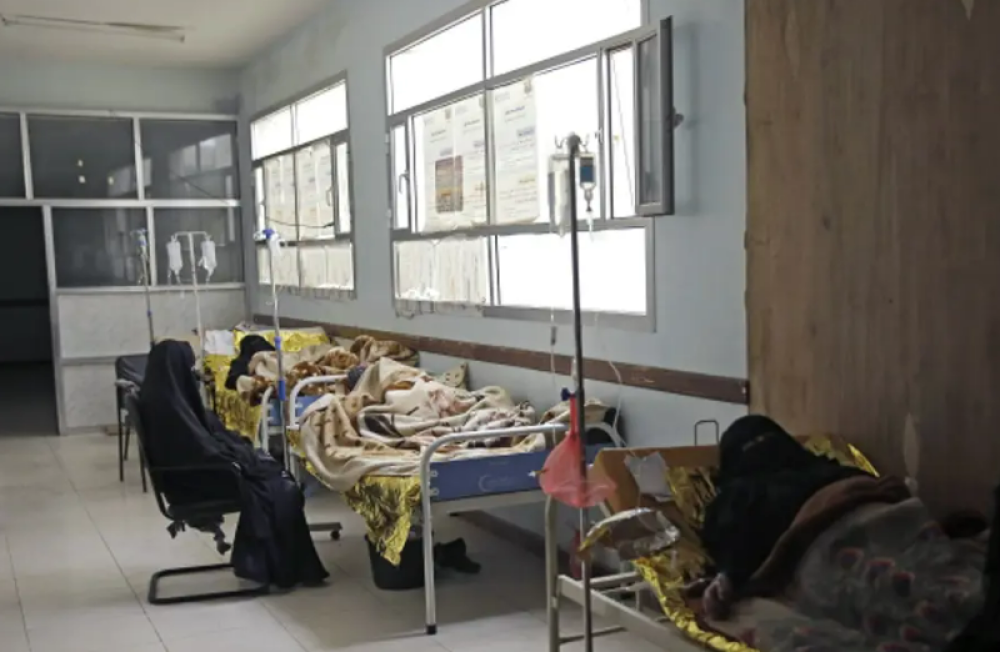Yemen: Houthis Obstructing Aid, Exacerbating Cholera


Yemen’s authorities are obstructing aid work and exacerbating a deadly cholera outbreak that is spreading across the country, Human Rights Watch said today. Parties to the conflict, including the Houthis, the Yemeni government, and the Southern Transitional Council (STC), have obstructed aid and access to information and have failed to take adequate preventative measures to mitigate the spread of cholera. Houthi security forces also have detained and threatened civil society staff, including humanitarian aid workers, in their recent arrest campaign.
Data collected by aid agencies indicate that between January 1 and July 19 there have been about 95,000 suspected cholera cases, resulting in at least 258 deaths, according to an individual working with the Yemen Health Cluster, a group of aid organizations, authorities, and donors led by the World Health Organization (WHO). All parties to the conflict should end their violations and abuses of Yemenis’ right to health, and the Houthis should end their arbitrary detentions of civil society and humanitarian aid workers.
“The obstructions to aid work by Yemen’s authorities, in particular the Houthis, are contributing to the spread of cholera,” said Niku Jafarnia, Yemen and Bahrain researcher at Human Rights Watch. “More than 200 people have already died from this preventable disease, and the Houthis’ detention of aid workers poses a serious threat to further limit the presence of lifesaving aid.”
Human Rights Watch spoke to seven doctors working in hospitals across Yemen on the cholera response, as well as several other health care professionals. Human Rights Watch also spoke to 20 aid agency officials, including doctors and epidemiologists, working to respond to the cholera outbreak and to a government health official. On July 24, Human Rights Watch wrote to the Yemeni government, the Houthis, and the STC with requests for further information. The Yemeni government met with Human Rights Watch and explained that many of their constraints in addressing the cholera outbreak were linked with a lack of funding. They also provided information demonstrating the actions they had taken to inform the Yemeni public about the outbreak. The STC responded stating that Human Rights Watch should direct their questions to the Yemeni government, though the STC comprises part of the Yemeni government’s eight-member presidential leadership council that replaced former President Abdo Rabbu Mansour Hadi in 2022. STC members also lead the Yemeni Ministry of Planning and International Cooperation (MoPIC) and the Yemeni Ministry of Social Affairs, both of which deal with humanitarian aid and have been involved in aid obstruction. The Houthis did not respond.
Yemen has been in conflict for nearly a decade. Beginning in March 2015, a Saudi and UAE-led coalition linked with the government conducted numerous indiscriminate and disproportionate airstrikes killing thousands of civilians in Houthi-held areas and hitting civilian structures, including hospitals, in violation of the laws of war. Warring parties have damaged and destroyed at least 120 medical facilities, as well as water and sanitation facilities.
Though the coalition has not conducted airstrikes since April 2022, when warring parties agreed to a ceasefire that has largely held, neither the coalition nor other warring parties have been held accountable or provided adequate reparations for the harm and damage to civilians. These attacks have debilitated an already underinvested health and sanitation infrastructure and contributed to the immense humanitarian crisis facing Yemen today.
Currently, over 18 million of Yemen’s 30 million people need humanitarian assistance, and aid agency funding has been cut each year, at least in part due to the aid restrictions by governing parties. Yemen’s severely damaged healthcare infrastructure, the lack of safe drinking water, high malnutrition rates, and growing levels of vaccine denial and hesitancy from Houthi vaccine falsehoods, according to several sources, have facilitated the spread and impact of cholera in Yemen.
According to a doctor working with a humanitarian aid organization in Houthi-controlled territory, though patients began showing signs of cholera starting in November 2023, Houthi authorities refused to acknowledge the crisis to humanitarian agencies until March 18, 2024, when there were already thousands of cases. In March, the Houthis finally began providing information about cholera cases in Houthi-controlled territory, but they still have not announced the outbreak publicly.
Houthi authorities have also detained at least a dozen United Nations and civil society staff since May 31, with informed sources telling Human Rights Watch that the number of those detained continues to grow. The arrests have left many agencies questioning whether or how to continue safely providing humanitarian aid in Houthi-controlled territories, which has the potential to further exacerbate the current cholera outbreak.
In the south, the Yemeni government, which includes the STC, quickly responded to the news of the outbreak in October 2023 by working with humanitarian agencies to set up clinics and procure necessary medicines. Though they have continued to share information with humanitarian agencies since the start of the outbreak, an informed source told Human Rights Watch that they have instructed aid groups not to use the word “cholera” in public statements, particularly in Arabic. This hinders people’s ability to take measures to prevent further spread of the disease.
Furthermore, aid agency sources said that the Yemeni government initially blamed migrants from the Horn of Africa for the outbreak, placing migrants in an even more precarious situation in Yemen. Most migrants in Yemen do not have legal documentation, with limited job opportunities and severe difficulties in accessing basic public services.
While the source of the outbreak is not clear, cholera is endemic to Yemen. According to the International Organization for Migration (IOM), during the last cholera outbreak in Yemen from 2016 to 2022, Yemen had 2.5 million suspected cases, constituting “the largest ever reported cholera outbreak in recent history,” with over 4,000 deaths.
Despite that immense toll, the authorities failed to take measures to prevent future outbreaks. Cholera spreads in large part via water and produce, such as fruits and vegetables, yet authorities and donors have not taken sufficient measures to invest in adequate water, sanitation, and hygiene infrastructure, which aid agencies call “WASH,” across Yemen, nor spread awareness in communities on effective, preventative hygiene and agricultural practices.
Many individuals working at humanitarian agencies also discussed the lack of funding for Yemen and the impact it has had on the cholera response.
The Houthis and the Yemeni government are obligated to protect everyone’s human rights in territory they control, including the rights to life, to health, and to an adequate standard of living, including food and water. Their aid obstructions violate these obligations. Although limited resources and capacity may mean that economic and social rights can only be fully realized over time, the authorities are still obliged to ensure minimum essential levels of health care, including essential primary health care.
Yemeni authorities should remove obstacles to aid delivery, including public health information. Houthis should also halt arbitrary detention and disappearances of UN and civil society staff and aid workers and release anyone held arbitrarily.
“The cholera outbreak will continue to spread and take lives so long as Yemeni authorities obstruct aid and authorities and the international community fail to adequately invest in prevention and mitigation measures,” Jafarnia said. “This can only happen in a space where civil society and humanitarian aid agencies are able to work without fearing for their safety.”

Mokha — Yemen is entering a highly sensitive stage as political and military developments accelerate, raising mounting warnings over the resu…

Red Sea — The European naval mission tasked with safeguarding international shipping lanes announced that an Italian frigate operating under…

Paris – The French Ministry of Foreign Affairs issued a statement expressing deep concern over the situation in Yemen, while reaffirming its…